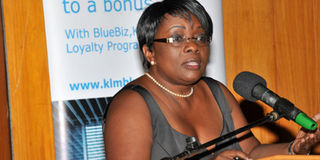How can women catch up in administration?

Julia Sebutinde
What you need to know:
Women may have made it to the boardroom, but they are still not chairing the boards or competing favourably for positions of power with men. Why is this so and what can be done about it? Brian Mutebi explores.
Strategic positioning. Excellence. Soaring the heights. A lasting legacy. How can a woman achieve that?
This was the question that dominated deliberations at the regional workshop for female public administrators at Mbale Resort Hotel in July. It was organised by Action for Development (Acfode), a non government women’s organisation.
The workshop brought together female public administrators from the districts of Dokolo, Pader and Namutumba to share experiences. The women sought to advance their succession to the top of public administration. Public administration involves governance at local and central government levels and management of public corporations.
It was observed that whereas there exist legal, policy and administrative frameworks for women to participate in public administration, women, who comprise of over 52 per cent of the country’s population, occupy only 22 per cent of the senior management positions.
Perhaps to explain this, you might have observed that in most public offices, it is women working as secretaries to mainly male bosses.
The obstacles
Maternal duty:
Florence Muhwezi, the Acfode chairperson, identified child birth and home care among these. “While some of these responsibilities can be shared, society has exclusively assigned them to a woman,” explained Muhwezi.
“You find that sometime, she might come late to work or need to leave early because she has got to breastfeed. This might work against her. What ought to be understood is that a woman might work for a shorter time but of higher productivity.”
Husband’s reputation:
Beatrice Molly Abang, the vice chairperson and secretary for finance and administration, Dokolo District, explained, “In Dokolo, a woman, despite her capabilities, can fail to win an election because of the bad reputation of her husband yet that is not the case for men. People will say his wife’s character doesn’t matter.”
Underskilled:
There is also the fact that some women do not have time or capacity to pursue further studies or amass the required experience.
Can a woman be on top?
Despite the challenges, there is agreement that women can rise to the top as Betty Akello, a health worker from Pader, emphasised; “We can be at the top, in politics, in business…everywhere. We need to be there.”
Acfode has trained female public administrators in the districts of Dokolo, Pader and Namutumba who have since formed female public administrators’ fora that influence the implementation of gender-responsive programmes.
Regina Bafaki, the Acfode executive director, said women should utilise the private sector enterprises like banks.
The First Lady and minister for Karamoja, Janet Museveni, shared how she has transformed Karamoja with partner development agencies. She emphasised the need for women to cooperate with men in climbing the success ladder. “If you do not,” she warned, “the men will feel entitled to belittle and isolate you.”




